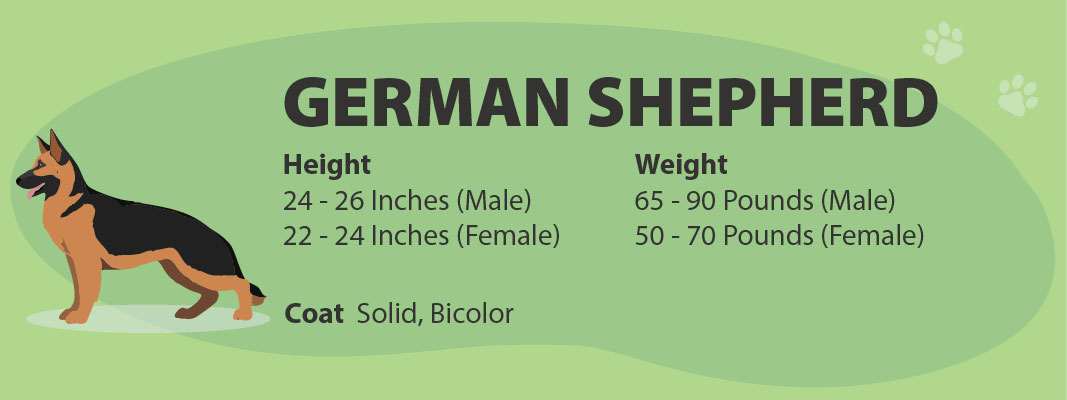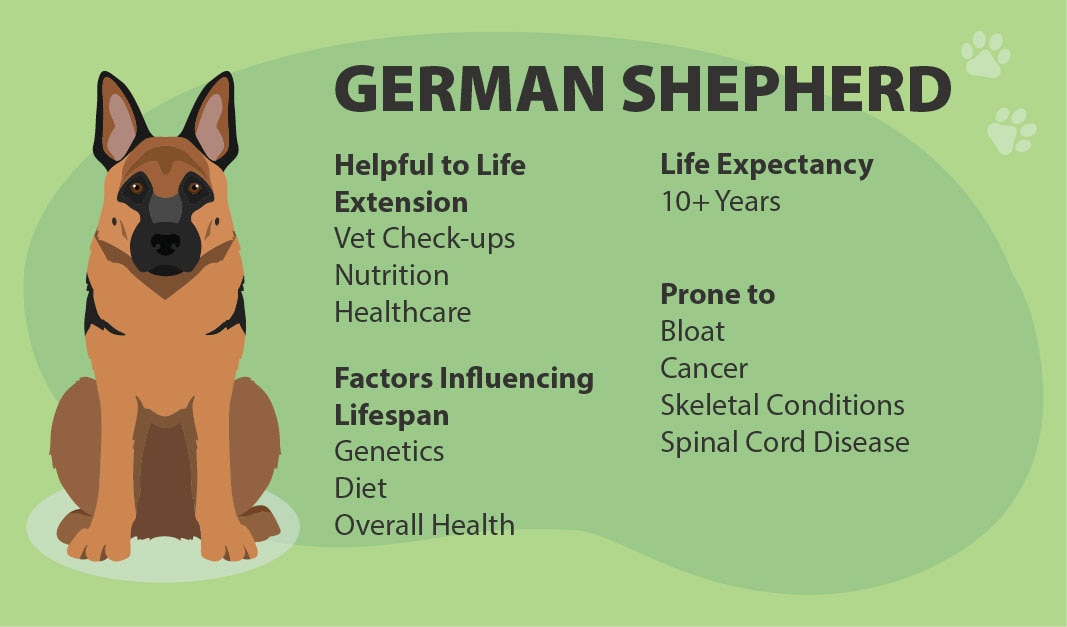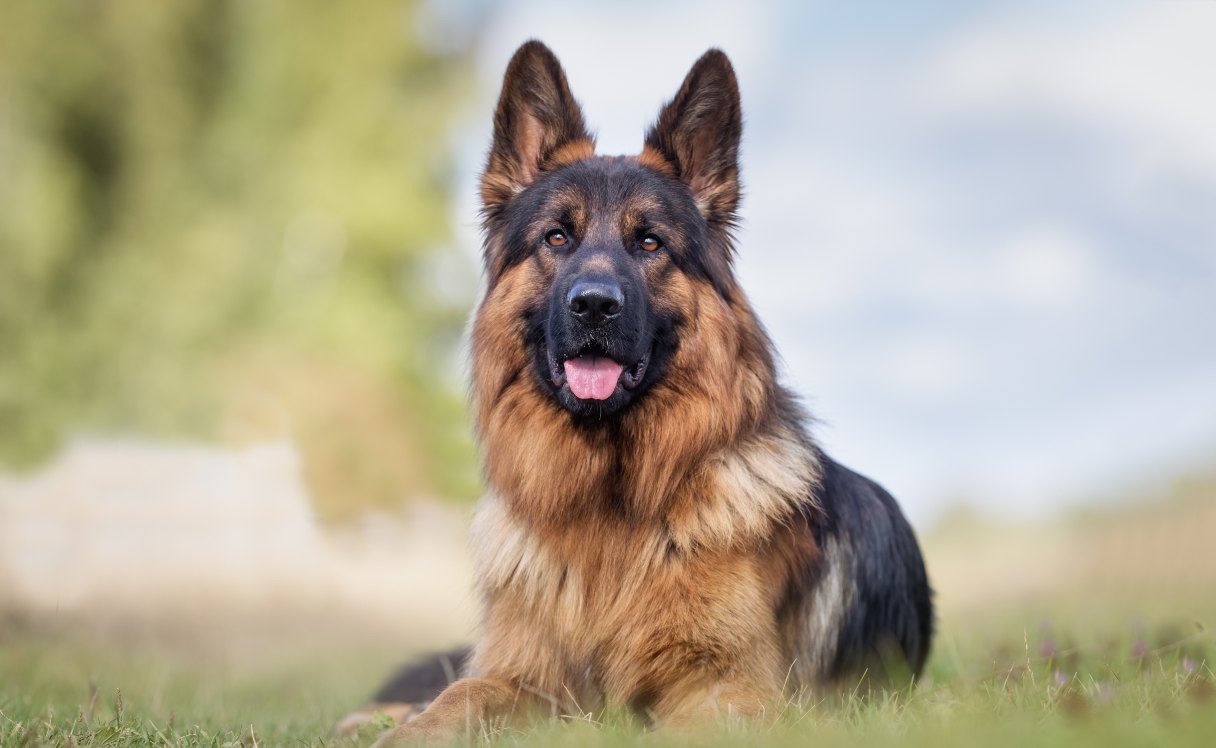German shepherds are the Swiss Army knife of dogs — good at a lot of different things, even if not the absolute best at any one thing. They have a well-earned reputation for being smart, fierce and extremely loyal. But if you’ve ever owned one, you know they’re also silly, sweet and very playful.
Although they can make great family dogs, this highly driven and active breed isn’t for everyone. Here's what you need to know about German shepherds to help you decide whether this breed is a good fit.
About the German Shepherd
The official name of this breed, according to the American Kennel Club (AKC), is “German shepherd dog,” or GSD for short. That might sound redundant, but it’s the literal English translation of the original German name “Deutscher Schäferhund.”1
The German shepherd was first developed in the late 1800s by German cavalry officer Captain Max von Stephanitz, who wanted an ideal German herding dog. He and other breeders crossbred herding and working dogs from all over Germany until they had a dog that fit the bill.1
Although the GSD was originally bred to herd livestock, von Stephanitz saw the rise of modern farming methods and subsequent decline in the need for herders as an opportunity to highlight the GSD’s skill and trainability as an all-around working dog. That reputation has led to German shepherds being the top dog for police and military work all over the world.1
German Shepherd Appearance

GSDs are large dogs, with males standing between 24 and 26 inches at the shoulder and weighing 65 to 90 pounds. Females stand from 22 to 24 inches and weigh 50 to 70 pounds.1
A well-bred German shepherd should have a straight back with a length that’s proportionate to its height, and not steeply sloping or curving. They have a long, bushy tail that is typically carried even with their back when in motion.2
The head is proportionate to the body and shaped like a wedge, with a wide forehead sloping down into a long and narrow snout. The ears are large, erect and angular with a soft point at the tip. Males tend to have a fuller, more masculine-looking head and face, while females look somewhat more refined.2
GSDs have a double coat that may be medium or long on the neck and body, but short on the head, face and legs. The outer coat may be sleek or slightly wavy or wiry.2
They may be a solid color or bicolor and come in a variety of marking patterns.1 Preferred colors, according to the breed standard, include black, tan, cream, silver, gray or red.1 Blue and liver are not preferred, and white disqualifies the dog from registration.2
German Shepherd Temperament
The AKC describes German shepherds as “loyal, confident, courageous and steady.” These are highly intelligent and fiercely loyal dogs who will lay down their lives to protect their loved ones.1
That said, they’re generally not aggressive.2 They’re highly affectionate and playful with their preferred humans.1 But they tend to be alert and aloof yet approachable with strangers.2
As an intelligent herding breed, GSDs are highly driven and extremely energetic.1 These dogs are bred to work, and if not provided with constructive activities, they become bored and may take matters into their own paws.1 This can lead to problematic behaviors, such as digging or destructive chewing.3
On the other hand, German shepherds are very easy to train, learning new commands with only a few repetitions and love showing off. They need plenty of socialization and obedience training from an early age to teach them good manners and impulse control, and keeping up with daily training throughout their lives can help tire them out mentally and help them stay calm.1
Living With German Shepherds
What kind of owner makes a good fit for a German shepherd? Here's what it's like to care for these dogs, along with tips to make life with your GSD go a little more smoothly if you decide to get one.
Who they're best for
These dogs do best with an experienced, active owner who can keep up with their boundless energy and has time each day to meet their exercise and training needs. These dogs won’t let you be lazy.1
Living space
GSDs are as versatile when it comes to living situations as they are with jobs. They get along great with kids and other pets and make excellent family dogs, but they can also form a tight bond with a single owner. They can adapt well to either city or country life, and they can thrive in small spaces as long as they have a place to get outside and exercise.1
Exercise and activity
German shepherds are fun-loving dogs who will play endlessly if they’re allowed.1 Recommended exercise is more than two hours a day.4
They’re heavy chewers and need heavy-duty toys that can stand up to abuse.3 These are also emotionally expressive dogs who “speak” through barking, grunting and whining.5
They’re alert and aware and will be quick to let you know about stranger danger, or if the squirrels are up to no good. Fortunately, they can be taught to stop barking on command.1
Early life
GSDs tend to be mouthy, meaning that they use their mouths a lot. As puppies, this means they chomp first and ask questions later, and their razor-sharp puppy teeth can be hard to handle.3
Their herding instincts make German shepherd puppies prone to attacking hands and arms.3 Early obedience training is a must with this breed.3 A crate can help curb impulsive behavior as well as make potty training easier.
Grooming
German shepherds tend to shed year-round but have heavy shedding once or twice a year.1 Daily brushing will help keep the hair under control.1 A good vacuum cleaner designed for pet hair is also a good idea.
Unless they get dirty, GSDs generally only need to be bathed once a month or so.1 Nails should also be trimmed once or twice a month.1 Brushing their teeth at least a few times a week can help prevent plaque buildup that leads to periodontal disease.
German Shepherd Health and Life Expectancy

The average German shepherd life expectancy is 10 years or more.4 However, many factors go into determining an individual dog’s lifespan, including their genetics, diet and overall health. Regular veterinary checkups and good nutrition and healthcare may help extend the life of a German shepherd.
German shepherds should be fed a high-quality dog food that’s appropriate to their life stage and has a nutritional profile approved by the Association of American Feed Control Officials (AAFCO).6 Look for dog or puppy food made for large breeds, which is specially formulated to support rapid growth and maintenance of large bones.7
Measuring their food according to the directions on the package and avoiding table scraps or too many treats can help keep them at a healthy weight.1
Despite these preventive measures, German shepherds can still face specific health issues inherent to their breed, which prospective and current owners should be aware of.
Bloat
Like other large, deep-chested breeds, German shepherds may be prone to bloat, a potentially life-threatening condition.1 To lower their chances of bloat, feed them smaller, more frequent meals instead of a single large one.8
Osteosarcoma
Osteosarcoma is a kind of bone cancer that typically occurs in large-breed dogs. It primarily affects key areas of long bones, such as the upper arm, lower thigh and upper shin, and often spreads to the lungs and other bones. Treatment may involve chemotherapy, radiation and/or surgery.9
Hemangiosarcoma
Hemangiosarcoma is usually found in the spleen, right auricle of the heart and liver. GSDs are more susceptible to this type of cancer, and it can lead to sudden death. Surgery is the most common course of treatment, but chemotherapy (and sometimes radiation) may also be considered.9
Hip dysplasia
Hip dysplasia is a painful skeletal condition that prevents the hip bone from fitting properly into the hip socket. It's common in large-breed dogs and may be treatable with surgery or nutrition and lifestyle changes.10
Elbow dysplasia
Elbow dysplasia is a similar condition affecting the elbow joint. It can lead to osteoarthritis as dogs age, but fortunately, it's treatable.11
Degenerative myelopathy
This is a degenerative disease of the spinal cord that results in eventual paralysis. It usually affects middle-aged or senior dogs. Unfortunately, there is no known treatment, although research into this condition is ongoing.12
Buying or Adopting a German Shepherd
AKC-registered German shepherd puppies from a reputable breeder typically cost $1,000 to $2,000 or more. Factors determining the price of a GSD puppy include location and whether the puppy is from a championship line. The price usually includes early vaccinations, health checks and genetic testing.13
German shepherds of all ages are available for adoption at pet shelters and breed rescues. The cost of adopting a German shepherd from a shelter typically ranges from $200 to $500 and usually includes the cost of vaccinations and spaying or neutering.14 You can find a list of reputable German shepherd rescue groups at the American German Shepherd Rescue Association.
Also, retired police dogs are sometimes available for adoption to the general public. Check with your local law enforcement for information about adopting a retired German shepherd police dog.
Frequently Asked Questions About German Shepherds
Here are some answers to frequently asked questions about German shepherds.
CareCredit Credit Card Financing for Dogs
The CareCredit credit card provides a convenient way to pay for your dog's vaccinations and other health and wellness expenses, including exams, medications and products at providers in the CareCredit network.* Continue your wellness journey by downloading the CareCredit Mobile App. You can find a provider on the go, manage your CareCredit account and easily access the Well U blog for more great articles, podcasts and videos. Use our Acceptance Locator to find a veterinarian that accepts CareCredit to help keep your pet healthy and happy for a lifetime of love.
In addition to pet care, you can also use your CareCredit credit card for dentistry, cosmetic, vision, hearing, health systems, dermatology, pharmacy purchases, spa treatments and so much more within the CareCredit network. How will you invest in your health and wellness next?
Author Bio
Jean Marie Bauhaus is a freelance writer and novelist who has been writing pet content since 2013. Her work has appeared on Forbes.com, Hill's Pet, Chewy, AKC.org and more.








